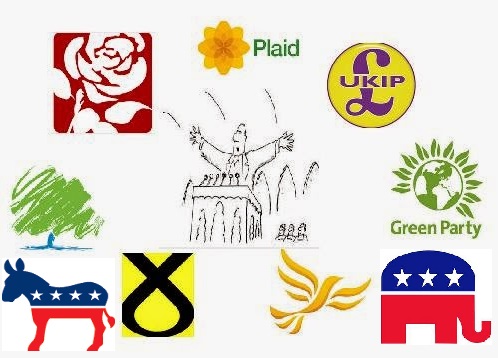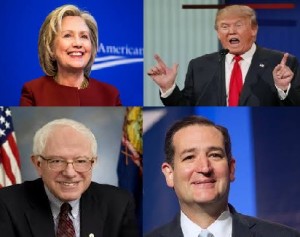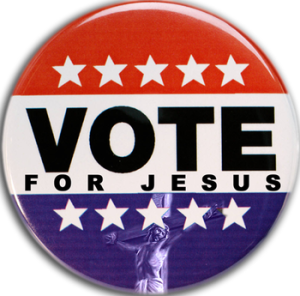 By Sam Tomlin
By Sam Tomlin
This was a post initially published about 18 months ago here. I thought I would re-publish it on matchfactory.org to raise the issue specifically in a Salvationist setting, and also because I have had some more thoughts since I wrote the original post.
The church’s relationship with politics has always been a tricky business. Many Christians simply disengage, thinking it has nothing to do with the spiritual task of the church and God in the world. I would argue strongly against this, with many others, suggesting the gospel is a significantly political proclamation as much as it is a ‘spiritual’ one (if indeed it is possible or helpful to separate the two).
But politics and party politics are subtly different things. Most Christians have opinions, however strong, on issues of defence, welfare, taxation, and if not those, certainly on same-sex marriage and abortion. These views will broadly put us in a traditionally viewed ‘camp’, be it ‘left’, ‘right’, ‘liberal’ etc.
For some, this is as far as it goes, but for others it will lead to allegiance to or even membership of a political party which, again broadly, encompasses these views we have on a variety of subjects. A party will have a set of concrete policies at any one time that supporters will (in theory) be endorsing. Clearly this is not always the case, but it does help differentiate between a political ideology (or set of values) and a party, the former concerning theory and the latter its application.
I have a number of Christian friends who are members of all the major political parties and some of the smaller ones too. Some are critical friends of their own parties and some are wholly devoted to their every policy move.
I am a member of a political party; anyone who knows me well or sees my posts on social media will probably be able to have a good guess which one, but in the last few months I have had an ongoing internal monologue going on in my mind. Jenni and I have been in training as cadets (trainee officers) for 18 months now, and are only a few months away from our first appointment. Knowing we are in many ways representing the Salvation Army on social media and in various conversations, and will one day be in leadership at a local church, should I air my party political views?
There is no question about airing political views. As I said before, the gospel is inherently political and the church and Christians always need to stand for justice, peace and what we see as right wherever we are (e.g. Micah 6.8). The church has both been the driver behind movements for justice and also shamefully silent or even antagonistic at the same time: apartheid in South Africa and civil rights in the USA are good examples.
But does party politics go too far? I know dozens of vicars, priests, officers and pastors I respect deeply, who think very seriously about theology and politics. What challenges me is that some do not seem to have any issue with declaring political allegiance, whereas others (who are still very political) do.
Illustrating this monologue, here are some rough outlines of arguments on both sides of the debate as I see it:
Church leaders should declare party political allegiance
– Politics (how we choose to structure our society) still primarily works through the party political system, and it is good to encourage people in congregations to be voting. If we do not vote and encourage others to participate in parties, it opens to doors for extremist parties.
– Just because I say I vote for a party doesn’t mean I will be telling people in the congregation or local community to vote for my party; it can promote discussion on various issues.
– It is good for political parties to have Christian voices in them, and church leaders are often well placed to speak prophetically into parties. Being a declared member of a party will give more scope for this.
– Church leaders are people with views (often very strong) – it is understandable they will want to express this through a channel which will challenge them to think, reflect and be active.
– We can still be critical of our party’s policies and their implementation even if we broadly sign up to their philosophy and vision for society.
Church leaders should not declare party political allegiance
– However much we think declaring an allegiance may not influence others, being in a position of authority means people will always listen to us and this can be (and has been) abused – look at church leaders endorsing parties in the USA, saying ‘if you don’t vote for ‘x’ you’re not really a Christian’.
– Politics is much more than the ‘party’ – we should be engaging primarily in our local communities, listening to people’s hopes, fears and aspirations and fighting alongside them for the system to allow their voice to be heard and for power to be held within the community whichever party is in power
– It is the church’s job to hold all political parties to account, and being perceived as a member of one party may limit our ability to do this. As church leaders, we have a specific responsibility to do this. It may limit our ability to do this if we are seen as ‘in one of the camps’.
_ _ _ _ _ _
Since I wrote this blog a while ago, I have done some more thinking (and acting, especially in the form of community organising), and in response I have veered more towards the latter position of not publicly declaring my allegiance to a specific party. I am still a member of the same party I mentioned above as I do believe that in a parliamentary democracy parties do represent different visions of our common life together (the basic meaning of politics) and I do want, in some way, to support this vision, however imperfect and ‘pre-Christ’s second coming’ it may be. However, I am far more cautious or even reticent to publicly declare this allegiance, especially as I am soon to be going to my first appointment where I will want to hold all local and national politicians to account including those in the party I feel most closely aligned to. I would not stand from at the pulpit and preach on ‘vote for x’; what degree of difference is there if I’m then promoting a specific party on social media? Perhaps that’s hypocritical – I’ll let you decide.
 The values I hold to and will publicly declare will of course roughly align me with certain political philosophies and understanding of how the state, market and individuals interact. It is impossible to get away from this. I have been very interested in the US presidential nomination debates, especially from a theological perspective (while there are some similarities, there are a number of differences between how our political systems function, especially with regard to the church in the US and UK). Giles Fraser wrote an interesting article on this recently, and in many ways I agree: if we are not careful, our (party) politics begins to influence our faith, and not the other way around. Does our conception of Christ start to look like Donald Trump or Bernie Sanders, or Ted Cruz or Hillary Clinton? I think that is extremely dangerous. The question should always be how our politics fits in with God’s mission expressed in His self-revelation in Christ, not vice versa.
The values I hold to and will publicly declare will of course roughly align me with certain political philosophies and understanding of how the state, market and individuals interact. It is impossible to get away from this. I have been very interested in the US presidential nomination debates, especially from a theological perspective (while there are some similarities, there are a number of differences between how our political systems function, especially with regard to the church in the US and UK). Giles Fraser wrote an interesting article on this recently, and in many ways I agree: if we are not careful, our (party) politics begins to influence our faith, and not the other way around. Does our conception of Christ start to look like Donald Trump or Bernie Sanders, or Ted Cruz or Hillary Clinton? I think that is extremely dangerous. The question should always be how our politics fits in with God’s mission expressed in His self-revelation in Christ, not vice versa.
Linked to this, another area I’ve been thinking about recently is the perceived (in my mind at least) tension between the very desire to engage in established political structures in the first place or to take a more disengaged approach (which can still be ‘political’). I recently read some James Davison Hunter for my Masters studies who seems to suggest there is a divide between those who engage in the ‘culture wars’ often expressed in competing ideologies (be they liberal, conservative, socialist etc.) trying to shout the loudest and gain the upper hand, and a neo-Anabaptist (think Shane Claiborne and  Stanley Hauwerwas as a rough guideline) stance which appears to be uneasy relating to established power systems on their own terms, even if they can be bent in order to bring about desired change, in favour of a more localised, incarnational attempt to live out Christian values and transform society from the bottom up – ‘Jesus for President’. Would this even go against a community organising model of political engagement? (This is of course a crude simplification, and perhaps I am wrong to draw such a division between these positions, but it is something I have been thinking quite a bit about recently).
Stanley Hauwerwas as a rough guideline) stance which appears to be uneasy relating to established power systems on their own terms, even if they can be bent in order to bring about desired change, in favour of a more localised, incarnational attempt to live out Christian values and transform society from the bottom up – ‘Jesus for President’. Would this even go against a community organising model of political engagement? (This is of course a crude simplification, and perhaps I am wrong to draw such a division between these positions, but it is something I have been thinking quite a bit about recently).
None of these questions are easy, and I am still tentative in my thoughts, and I would be interested to hear others’ thoughts on the matter, especially those in some form of church leadership? How should the Salvation Army approach these issues?

This is a really helpful post, Sam. My thinking on this has been driven by the third point in ‘why not’. A party-political allegiance diminishes the relational power you’ve worked hard to build up, meaning your capacity to hold people to account is lessened. The hard graft of turnout for that imaginative action can all be ruined by a poor strategic decision to get a selfie with your favourite!
I understand there are exceptions to the rule – but if we’re serious about organising for social change, we need to be serious about our public relationships.
Thanks again for the thoughtful approach you’ve taken on this.